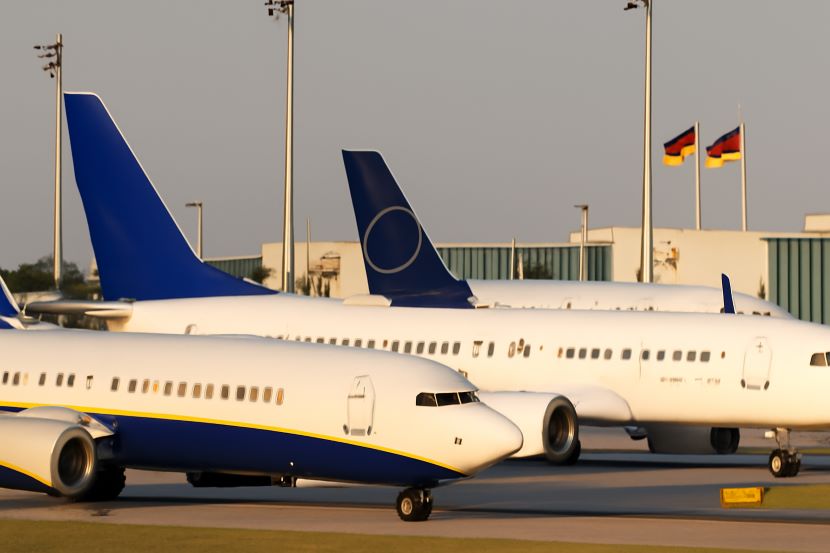Home » AIRLINE NEWS » High Aviation Taxes Lead to Major Flight Reductions in Germany by Lufthansa and Ryanair
Published on
October 27, 2025
Germany’s aviation industry is undergoing a significant adjustment as Lufthansa and Ryanair announce cuts in their flight schedules for the 2025 winter season. Both airlines are reducing their capacity in response to the high costs of operating in Germany, highlighting the challenges the country faces as an aviation hub.
These cuts come amidst growing concerns within the aviation sector, with both airlines seeking tax relief to remain competitive. As Germany continues to fall behind other major European markets in its recovery from the pandemic, these decisions reflect the urgent need for a supportive aviation environment.
Lufthansa’s Winter Cutbacks: 100 Weekly Flights to Be Reduced
Lufthansa, Germany’s largest airline, has confirmed that it will reduce its domestic operations by approximately 100 weekly flights starting in the winter of 2025. This reduction follows the airline’s struggles with rising operational costs, including high aviation taxes that continue to burden the industry.
The airline has faced significant pressure due to increasing location-based costs in Germany. By cutting domestic flights, Lufthansa aims to streamline its network and minimize losses. This move will affect passengers traveling within Germany, limiting the options for short-haul flights and reducing overall connectivity.
Ryanair’s 800,000 Seat Reduction: Impact on Germany’s Travel Market
Ryanair, known for its budget-friendly flights, will also cut over 800,000 seats in Germany this winter. This significant reduction is part of the airline’s broader strategy to adjust to the increasingly costly aviation landscape in the country. Ryanair has often been a popular choice for travelers looking for affordable flights, but these cuts may limit options for those relying on budget carriers for travel across Europe.
The seat reductions are expected to impact routes from Germany to various European destinations, particularly affecting those seeking affordable travel during the colder months. While Ryanair’s move is part of a larger strategy, it highlights the broader issue of rising costs in the aviation sector.
The German Aviation Sector: A Call for Government Support
Both Lufthansa and Ryanair’s capacity cuts highlight a growing issue in Germany’s aviation industry: the high cost of operating within the country. The German Aviation Association (BDL) has been vocal in urging the government to introduce tax relief to help aviation companies remain competitive.
Germany’s coalition government, however, has backtracked on its initial commitment to reduce aviation taxes due to budget constraints. The aviation sector had hoped for tax cuts when the government took office in April 2025, but as the budgetary pressures mount, these hopes have not materialized. The aviation industry’s struggles are compounded by Germany’s lagging recovery compared to other major European markets.
The Road Ahead: Can Germany’s Aviation Industry Recover?
Germany’s aviation sector is struggling to regain its footing in the post-pandemic era. With Lufthansa and Ryanair making significant cuts to their operations, the future of Germany as a leading aviation hub is uncertain. The industry’s reliance on government support through tax relief has become more pressing, but with mounting budgetary challenges, it remains unclear whether the government will act.
For travelers, these cuts may mean fewer options for flying in and out of Germany. If the trend continues, Germany could risk falling further behind other European nations that are investing in their aviation infrastructure and offering more competitive pricing.
Conclusion: Germany’s Aviation Crisis Needs Urgent Attention
The aviation industry in Germany faces a critical crossroads. Lufthansa’s and Ryanair’s decisions to cut back on flights reflect a broader trend of rising operational costs and government inaction on much-needed tax relief. As Germany’s aviation sector continues to fall behind its European counterparts, the government’s response to the industry’s challenges will be crucial in determining whether the country can remain competitive on the global stage.
For tourists and travelers, the reduction in flight options may make travel to Germany less convenient and more expensive. With ongoing changes in the aviation landscape, travelers are advised to keep an eye on future developments in the German aviation sector.
